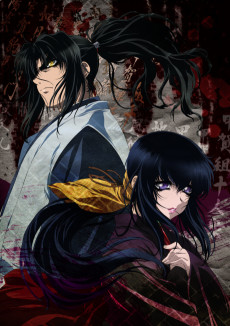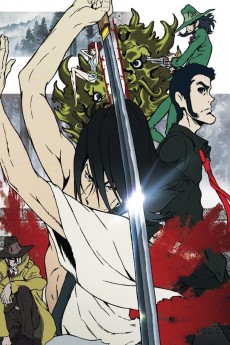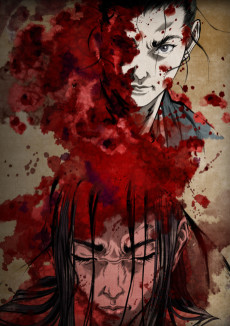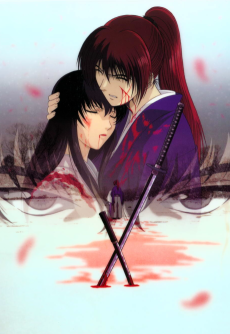JUUBEE NINPUUCHOU
MOVIE
Dubbed
SOURCE
ORIGINAL
RELEASE
June 5, 1993
LENGTH
94 min
DESCRIPTION
Jubei Kibagami has always been the master dealer of death, but in rescuing a ninja woman from a monster he sets loose a chain of events that puts death in his own veins and sends them on a nightmarish odyssey through a surreal and devil infested ancient Japan. How do demonic possessions, an annihilated village and a man Jubei thought safely buried in his past all connect? If Jubei can't piece the blood-soaked clues together, his only consolation will be that he won't live to regret it for very long! Prepare your mind and steel your gut for the insanely gore-packed orgy of violence that still stands alone and unchallenged as the ultimate anime action feature.
(Source: Sentai Filmworks)
CAST
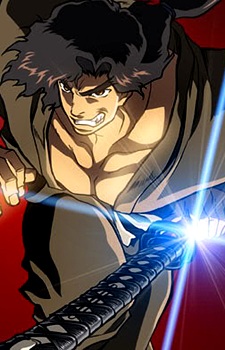
Jubei Kibagami
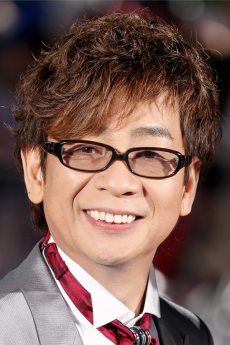
Kouichi Yamadera

Kagero

Emi Shinohara

Dakuan
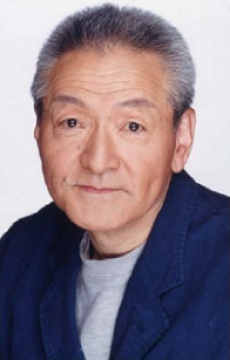
Takeshi Aono
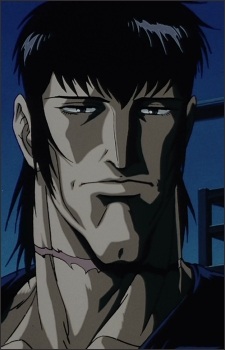
Gemma Himuro
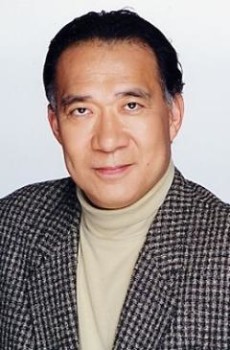
Daisuke Gouri

Zakuro

Masako Katsuki

Benisato

Gara Takashima

Yurimaru
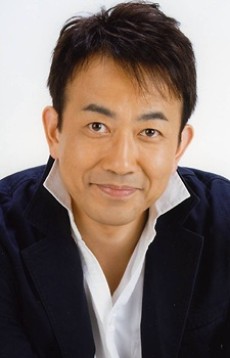
Toshihiko Seki

Mujuro Utsutsu
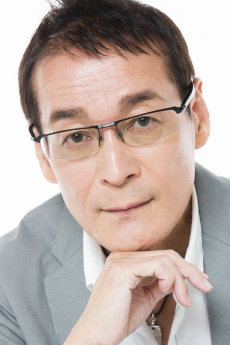
Norio Wakamoto

Tessai

Ryuuzaburou Ootomo

Murabito

Katsumi Suzuki

Mushizo
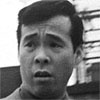
Reizou Nomoto

Hyobu Sakaki
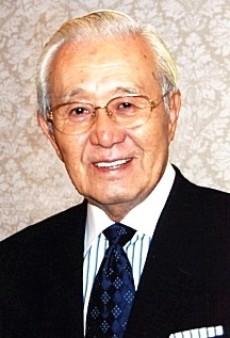
Shuichiro Moriyama

Shijima

Akimasa Oomori

Fukumen Bushi

Osamu Saka

Doujin
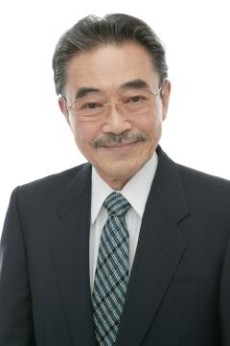
Ichirou Nagai

Hanza

Katsuji Mori

Genpachi

Yuusaku Yara

Shinkurou

Junichi Sugawara
RELATED TO JUUBEE NINPUUCHOU
 ANIME AdventureJuubee Ninpuuchou: Ryuuhougyoku-hen
ANIME AdventureJuubee Ninpuuchou: Ryuuhougyoku-henREVIEWS

skyebadoo
70/100Great looking movie with some cool fights, though lacking in narrative originality.Continue on AniListNinja Scroll is often recommended as one of those 90s anime, one the visual masterpieces that cell animation fans point to as an example of just how good cell animation can look. This set a fairly high standard of expectation, though knowing absolutely nothing about the story of the movie was definitely to its benefit because it would be a stretch to call it anything particularly original.
The visuals met the expectations and then went beyond them. I've always been a particular fan of cell shading, but Ninja Scroll really exceeded itself in how gorgeous it looked. A mixture of strong shading and realistic character designs made the movie feel grounded and serious before it had the chance to lay out the sincerity it was going to present later. Animation wise, there were some simplistic moments, but these were played into benefits due to the excellent cinematography and colour work - one fight in a strongly contrasting orange on black scene stuck out most in this regard though most fights were laid out in similarly impressive more diverse ways.
Jubei comes off as a fairly cool, if somewhat generic protagonist, "the good Ninja" kind of deal. He does jobs cheap and has a tragic backstory, the standard stuff but he works for his purpose. The beginning of the film is a bit incoherent, some clans send out ninja's and Jubei fights some people and there's a rape scene and it's just really weird. Half an hour in, more sense starts to be made, and some old man teaches Jubei about a huge conspiracy with the ominously named "Shogun of the Dark" (who we never meet incidentally). The huge conspiracy isn't really the point in the movie though, it seems to be more about the isolated role of Jubei and the woman Kagero, who was much less generic since we see exploration of the denial of humanity and the aim to achieve it with her. Jubei fights 8 different "demons" throughout the film, with equally unique abilities and quirks. The fights actually don't last very long, but the simplicity of them lends itself to grounded nature of the film. This creates an interesting contrast with the insane powers of the ninja and the more logical and grounded solutions to each conflict, I'm not really sure if that was supposed to represent something but it was cool. The movie ends both dramatically and tragically and then trails off into the potential for "there's more to come" - but Jubei's arc really ends here, he's made his peace, and it's time for him to move on with his life.
To conclude, the movies peaks were very high, great animation and scale in the fights helped to create an awesome experience, though the generic nature of the story and the fumbling, seemingly random nature of the beginning prevent me from being able to call it overly special on the whole.

AdmiralNyan
90/100Ninja Scroll & the Blood-Soaked Criticisms of Japan’s Corrupt Government During Pre and Postwar EraContinue on AniListNinja Scroll (獣兵衛忍風帖) is a 1993 seinen, jidaigeki-chanbara (period samurai film) motion picture that was produced by Animate Film and written and directed by Yoshiaki Kawajiri (Vampire Hunter D: Bloodlust). The film takes place in feudal Japan and revolves around a rōnin named Jūbei that gets caught up in having to battle the Eight Demons of Kimon, who are ninjas with supernatural abilities and powers, that are hellbent on overthrowing the Tokugawa Shogunate. The film is considered by many to be one of the best anime films ever made, and after re-visiting it a couple of months ago, I can understand why.
There are many things that make this motion picture so fantastic and, to certain degrees, quite relevant to the world’s climate, at least in the West. Between the amazing animation and gloriously gory violence, to the solitary figure who saves the day, and the thrilling fights between Jūbei and the Demons of Kimon—there is plenty to love and adore here. However, my absolute favourite facet is the creative methods of discussing the corrupt government and how they ultimately end up distorting the very people they claim to want to help.
Ninja Scroll is quite typical of Japanese mysteries from the post-war era in that it critiques the fallacies within a government that continues to let its people down time and time again, thus pushing them to the point of acting on behalf of themselves. This is a common occurrence in most, if not all, of Edogawa’s Rampo’s works, as well as Fūtarō Yamada’s works, who was discovered by Rampo, and who became the inspiration behind the film’s creation. Different facets of their pieces tend to play as allegories for the various issues and criticisms held by the citizens. Although, if I had to choose one individual with whom Ninja Scroll resonated the most during my watch through, it would be Osamu Tezuka.
One of the main reasons that Tezuka popped into my head is because of the manga Dororo, which I re-read after watching the anime. Tezuka was a brilliant individual who laced some hefty critiques of Japan’s mishandling of the nation post Second World War into his creations and Dororo is a prime example of that. It exhibited Japan’s lust for esteem and dominant authority as an Asian superpower via similar characteristics that were portrayed in Ninja Scroll.
For example, both titles use historical eras to formulate their contemporary condemnations. Both have demons or devil creatures that stemmed from a pact made with a Satan-centric figure. Each demon was a challenge that tested the chosen hero for a unique set of abilities, and thus prepared him to take on the big baddie at the top of the power ladder. In Dororo, it was to save a village while climbing the rungs of political prestige, whereas in Ninja Scroll it was to commit a coup. Both serials have a solitary anti-hero riding the line of neutrality as they happenstance come across the demons, and by the end their journey turns into one of vengeance rather than a moral sense of justice.
In Ninja Scroll, the brutality and violence worked as a metaphor for the rage that fuelled the general public as well as depicted the savagery of which the government treated their people. The Demons had to become the worst versions of the things they were hoping to abolish via the takedown of government leaders. In the end, most of them utterly lost sight of what it was they wanted to accomplish to begin with; their self-righteousness replaced by a prevailing thirst for inciting chaos, and this prevented them for carrying out their mission.
Jūbei represents the people who mind their own business and just try to survive from day to day, hoping to outlive the government or die in peace while things go to shit around them, until he’s backed into a corner, then he only fights for as long as it contributes to his continued existence. He’s the type of person that unknowingly starts a revolution because he was pushed far enough to fight; a grey individual that swims in a detachment that prevents him from falling into a stereotypical role of self-righteous heroism. The only reason he becomes so invested in kicking everyone’s ass is because he wants revenge for what is done to someone he grows to care for quite deeply for. How many figures can you look at in history or even fiction who never set out to become the face of a movement, but only acted in a moment’s of weakness or overwhelming emotion? It’s passionate and instinctive and honest—all the things that corruption can either never snuff out or fails in comparison to. He is the antithesis of venality.
Ninja Scroll’s marvellous commentary on fucked-up governments and their gross negligence of the people of a nation is a pretty compelling and one of the main reasons that I love the film so much. There is something new for me to experience or uncover every time that I watch and re-watch it, a feat that few films can offer. A second aspect that I appreciate about the motion picture is the animation. Even 27 years after its release, the animation holds up rather brilliantly. It’s beautifully detailed and vivid, even amid palettes of dark blues and bright reds. The lighter colour schemes help shift the tone and juxtapose Jūbei’s evolution throughout the film. The swordplay is sharp and captivating, and the female bodies aren’t excruciatingly disproportionate, but more natural and organic in shape.
Even with all these brilliant attributes, Ninja Scroll definitely shows its age to some degree, especially where women are concerned. It’s decidedly anti-feminist as women are dehumanised, whether they are fierce fighters and talented ninjas or not. There are graphic sequences of attempted rape and molestation as well as heavily sexist dialogue that the intersectional feminists of today will not appreciate at all. Unfortunately, it is an accurate representation of how women were perceived during the Tokugawa era of Japanese history, but that doesn’t make it any more agreeable. I was also disappointed with the minimal screen-time that some of the side characters received as I found quite a few of them to be wholly compelling. More information about them, particularly about their past, would have been a marvellous addition. In some instances, their presence in the film became a bit of a superficial convenience. I know there is an anime TV series for Ninja Scroll, and I’m hoping that there will be some character exploration there.
All in all, Ninja Scroll is an excellent film. I’m happy that I took a chance and re-watched again it after many, many years. It holds up remarkably in some ways yet not so much in others. The film is a great way to get acclimated to traditional chanbara media, and it’s also a superb work for constructing discourse on how creative fiction outlets play a part in the harsh critique of the more toxic areas of Japanese history, specifically pre and post-war era. Plus, it’s just an outstandingly brutal and badass film of ass-kicking shenanigans.

WeepingClown
83/100The visual poem of a bloody beautiful story.Continue on AniListIt is extremely important to discuss the history of anime and its animation when talking about Ninja Scroll. A movie considered as one of the most influential anime ever made by many, it was one of the earliest anime to popularise mature, or adult oriented, anime outside Japan, along with classics such as Akira and Ghost in the Shell. The movie was one of the earliest popular slasher anime too, showing violence, blood and gore, and even nudity and sexual assault. It's important to keep in mind that Ninja Scroll is a historically important piece to the anime culture.
Ninja Scroll is not a difficult movie to examine in terms of story. The protagonist Jubei is a good hearted and talented Ninja who gets swept up in a conspiracy which actually has connections to his past. This is just another variation of the popular theme of Samurai-Ninja movies and is nothing special in itself. Rather, it's the simplicity in narration that makes the story interesting. Jubei fights with eight different enemies who possess special techniques of their own, but defeats them all using seperate countermeasures, after an initial struggle. The process itself is perhaps common, but the idea of countering adversities with not only power but also wit is intriguing to watch. In contrast to the so called 'nakama power-up' and 'breaking limits' in shounen anime and such, this is a very refreshing experience, not to mention it is one of the oldest anime to introduce the effectiveness of the technique. Another beautiful part about the story is the emotional attachment of characters in the story as well as their emotional awareness towards their self. Kagero is a woman who's fated to never really love a man because of her body constitution and have always been considered as a poison master. The experience with Jubei provides her with the awareness of being treated as a woman and asked to treasure the life one has. It's visible that she just wanted to escape her wretched fate when she reveals to Jubei that she just wanted him to take her. One visible flaw action films have more often than not is the incapability to emotionally attach characters to the story. Ninja Scroll is different in that regard and is successful in linking those emotional elements to the story well. But in essence, it is a story that starts with the arrival of a mercenary ninja and ends with the departure of him.

The more famous and beautiful part of the film is its animation. It is an anime that is pointed out by many as an example of dazzling cell animation. The story is simplistic but the art narrates on its own. As such, it can basically be included in the 'visual poem' category. As an action anime that's praised highly for its beautiful action sequences it's already a success. The short length nature of action scenes are actually extremely suitable to the story nature as well as a non hindrance to the narration. Kaoru Wada's music also is befitting for the anime ambience and is a perfect fit for the action scenes in particular. The lovely voicing of Kouichi Yamadera and Emi Shinohara also deserves praise.
Ninja Scroll is a film that represents all the beauty of vintage anime. Its story is lacking to be called as one of the greatest anime films, but technically it doesn't really fall behind any other anime. Its style is representative of an era and it is historically important, thus it's not exactly wrong to positively call the anime a 'relic'. Perhaps it's not to everyone's taste, but it has always been one of my favourite anime movies. The song 'Somewhere, Faraway, Everyone is Listening to a Ballad' by Ryohei Yamagishi is still my favourite ending song from all the anime I've ever seen, and in my opinion the whole essence of personal relationships in the films is beautifully conveyed through its lines;
"_Come with me, lets go out to see the stars Night has only just begun I don't want anything, only for you to be at my side, with a smile on your face_"
SIMILAR ANIMES YOU MAY LIKE
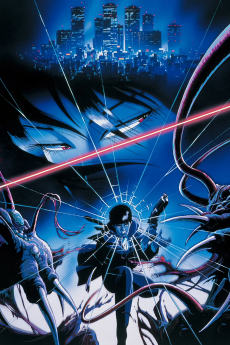 MOVIE ActionYoujuu Toshi
MOVIE ActionYoujuu Toshi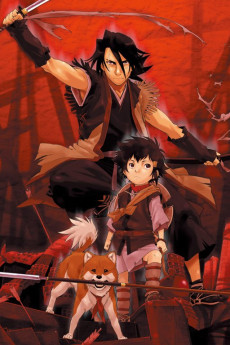 MOVIE ActionStranger: Mukou Hadan
MOVIE ActionStranger: Mukou Hadan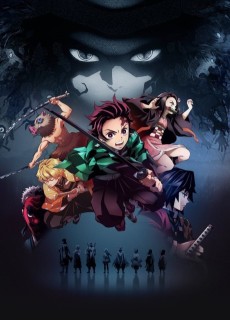 ANIME ActionKimetsu no Yaiba
ANIME ActionKimetsu no Yaiba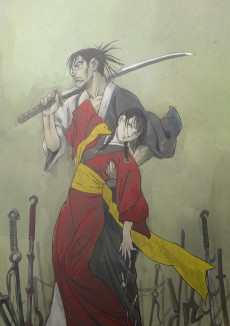 ONA ActionMugen no Juunin: IMMORTAL
ONA ActionMugen no Juunin: IMMORTAL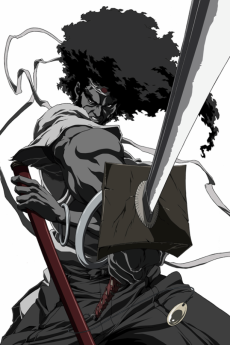 ANIME ActionAfro Samurai
ANIME ActionAfro Samurai ANIME ActionKenpuu Denki Berserk
ANIME ActionKenpuu Denki Berserk MOVIE ActionVampire Hunter D (2000)
MOVIE ActionVampire Hunter D (2000)
SCORE
- (3.6/5)
TRAILER
MORE INFO
Ended inJune 5, 1993
Main Studio Animate Film
Trending Level 1
Favorited by 563 Users


